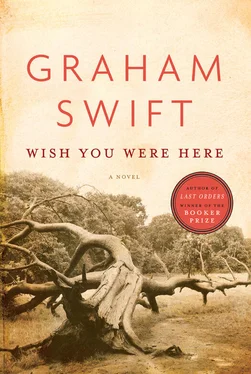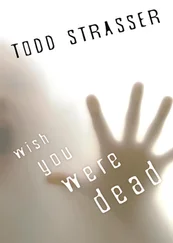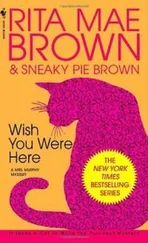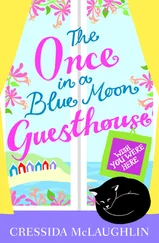Was it the beer starting to work? In the wrong direction? While he waited for his food and looked at the Daily Express —though as if the newsprint might have been mere gauze — it seemed suddenly to Jack that he was perfectly capable of becoming one of those strange men in pubs who can rear up suddenly and accost others with their uninvited stories, their riddles, or their sheer, frothing rage. That sort of thing could happen, after all, at the Lookout (it could happen in the Ship, but then it was not his business). The furies that a fortnight’s holiday could sometimes, oddly, release. The pressure-cooker of a caravan under three days of rain. It seemed strange to Jack that he could actually exert a calming influence in such situations — or maybe just look like a man no one would want to take on. A gangster even, apparently. He’d entered that hardly intimidating hotel like a mouse.
He was better at stopping fights, perhaps, than picking them, better at quelling anger than venting it. Yet now he felt he could almost go up to the bar and thump it and be one of those desperate, belligerent men. He might get out the medal, unlock it from his clenched and brandished fist. ‘See this? See this, everyone? See what I’ve got here?’
A girl appeared from nowhere, bearing his steak and some cutlery wrapped in a paper napkin. Black skirt and white blouse. Her brief attentiveness (though she would never know it) entirely defused him. She gave him, as she put down his plate, a quick, direct smile. He couldn’t see why he deserved it or why it should have come just as his thoughts had begun to boil. Did he look as if he needed soothing? That was two warm female smiles he’d had in the last two hours. Did he look as if he needed mothering?
He ate his steak and chips, drained his second pint. Before ordering a third drink he went for a leak. It was one of those places out the back along a short exterior alleyway exposed to the elements. The strip of air was like a knife. The band of sky above showed a glittering star or two. Frost tomorrow, he thought, like a farmer crossing a yard. Frost — a white dusting on the hills, on the distant heights of Dartmoor. Ten-thirty at Marleston church. It was really happening. Babbages had said, ‘Leave it with us.’ Undertakers would say that. Leave it with us.
It was pisshouse air, but it was the undeniable air of Devon. It was like the air of a cowshed. He splashed steamily against stained stainless steel. When he returned to the bar, Tom was sitting there in his place — saving it for him, so it seemed. He got up and vanished as soon as his brother entered. Jack went to the bar and ordered a large scotch. No pudding. His belly felt full and he thought the odds of getting a second smile from that girl were against him. He wanted not to spoil the first. The beer was working. He took his scotch slowly — still remarkably engrossed by the Daily Express —then left. It was barely half-past eight, but what else could he do? At Jebb, in the winter, they were sometimes all in bed at nine.
The streets were empty and quiet, as if under curfew. He walked pointlessly, in the cold, around a corner or two, along a street or two, then back. But it was all right now, he judged. He wasn’t thinking about anything much. The girl’s smile. Boots, Martin’s newsagents, NatWest Bank. He walked with no sense of being shadowed or accompanied, but he felt that he himself, now, had become like some gliding ghost. He found his way to the Globe again and stepped in with a strong need not to be noticed. But the reception desk was empty. He made it to the stairs. There was a murmuring along the hallway in the hotel bar, the sound of a football-match commentary. He unlocked his room, switched on the lights and the clicking heater, though the radiator seemed to be functioning now. He was sure, as he entered, that Tom must have been lying on the bed, his soldier’s boots crossed over each other, his helmet beside him. But the dent in the bedspread was his own.
It was not yet nine. He could phone Ellie. He could flick on his mobile phone at last and see if she’d left any message. He could call her. But what should he say? I’m in Okehampton, Ellie. So’s Tom.
I’m in Okehampton, Ellie. Why aren’t you?
He pulled back the bed covers so that the warmth of the heater might directly reach the sheets. It would have to be a frosty night. He saw the dip of Barton Field. But he didn’t want to think of anything. He undressed. He put the medal on the bedside table. Then after getting into bed — it was perhaps only a beery whim — he took it from the table and placed it under his pillow. Within minutes, curled beneath the covers, all the lights switched off and the heater, for good measure, left on low, he’d crashed, just as planned and wished, into unknowingness.
But at some point later — he couldn’t tell how long he’d slept — he woke up in the darkness as if some quite distinct and alarming event or perhaps some terrible but instantly forgotten dream had roused him, his pulse racing, his head throbbing, his teeth grinding like millstones.
And clutching a medal.
JACK HAD EVERY REASON to remember that last Remembrance Day.
November, 1994. Just him and Dad. Almost a year since Tom had gone — his name no longer being mentioned, and Jack himself no longer suffering (though he had for months) any proxy punishment for his brother’s absence. A kind of muddled realignment, as if his father might have said now of Tom, in the way he might have spoken of any reconsidered investment, any shelved bit of farm planning: Well, we did the right thing there, Jack boy, didn’t we, not to press ahead with that . As if Tom’s departure had only revived the fortunes and workability of Jebb Farm. Which it very clearly hadn’t.
But that anniversary had been coming up — the anniversary of Tom’s departure which was also, anyway, his birthday. And before that there was Remembrance Sunday, with its tradition of dogged observance in the Luxton family. And how would they deal with that now — now that Tom had gone off to be a soldier?
Jack had left it to his father, and wouldn’t have been surprised if Michael had said (though it would have been the first such omission, so far as Jack knew, in the annals of the household): ‘In case you’re wondering, we’ll give it a miss this year.’ And even spat.
But his father had said: ‘I hope you’ve got your suit ready for tomorrow.’ And then had said: ‘I got these when I was up at Leke Cross.’ And had handed over one of two paper poppies with their green plastic stalks.
None of this, on the other hand, had been done with much animation, and Jack’s assessment had been that his father couldn’t lose face in front of the village. As Luxtons, they simply couldn’t neglect their annual duty. Michael’s later, unspoken but manifest decision not to enter the Crown for the customary drink — where, of course, he might get drawn into some discussion about his younger son’s whereabouts — seemed to go along with this. He would turn up for the ceremony, but he drew the line at anything else.
Jack didn’t have then in his vocabulary (he doesn’t really now) the word ‘hypocrisy’. It would have sounded then to him like a word a vet might use — something else cows might go down with. As for getting his suit ready, he didn’t know what that could mean other than taking it off the hanger where it had hung all year long.
But there was a seriousness, even a strange conscientiousness, about Michael’s behaviour on that Remembrance Day. He seemed to present himself in the farmhouse that morning more painstakingly, more brushed and scrubbed about his face and hands, than he’d ever done before. He fixed the poppy in his lapel not cursorily, but with a degree of care, as if it might have been a real flower and he was going to a wedding. He’d duly produced the medal and in plain view, like a conjuror beginning some solemn trick, slipped it into his breast pocket so that Jack would note it. On the other hand, after he’d examined Jack’s turnout — rather rigorously, and that too was untypical — he’d given a weird smirking expression, as if to say, ‘Well, this is a bloody joke, isn’t it?’
Читать дальше








![Питер Джеймс - Wish You Were Dead [story]](/books/430350/piter-dzhejms-wish-you-were-dead-story-thumb.webp)



